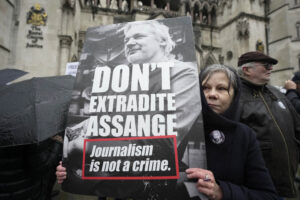Leaked Guantanamo Files Won’t Harm Nation, Key Manning Witness Says (Video)
A former chief prosecutor at Guantanamo Bay prison testified at Bradley Manning's trial Tuesday that the Army private's disclosure of classified detainee assessment files to WikiLeaks had no value to enemy groups and did not harm American national security.
A former chief prosecutor at Guantanamo Bay prison testified at Bradley Manning’s trial Tuesday that the Army private’s disclosure of classified detainee assessment files to WikiLeaks had no value to enemy groups and did not harm American national security.
Col. Morris Davis was chief prosecutor in the Guantanamo military tribunals from 2005 to 2007. He told the court in Fort Meade, Md., that he had checked a sample of detainee files leaked by Manning against information that was publicly available at the time of the disclosures. He found much overlap and repetition, including passages in the official prisoner assessments that were virtually word-for-word copies of freely available material.
“A lot of the information was repetitive of comparable open-source information that was available in print,” Davis said. “You could read the open-source information and sit down and write a substantial version of what was in the DAB [detainee assessment brief].”
Manning pleaded guilty to passing more than 750 of those briefs to WikiLeaks in 2010, an admission that carries a maximum sentence of two years in jail. The U.S. government has pushed for charges based on a higher offense, violation of the 1917 Espionage Act, claiming that the young soldier understood that his leaks could be used to harm the United States. That offense carries a punishment of 10 years in custody.
Manning pleaded guilty to lesser offenses carrying a maximum sentence of 20 years. The U.S. government is pursuing prosecution on 22 counts that could jail him for a maximum of 149 years.
— Posted by Alexander Reed Kelly.
Your support matters…The Guardian:
Davis’s testimony was intended by the defence to rebut the allegation that the soldier had wilfully communicated classified information “with reason to believe such information could be used to the injury of the US or to the advantage of any foreign nation”. The witness said that he had compared the five leaked Guantánamo assessment files for which Manning has been specifically charged with information released by the government itself, including Pentagon publications from 2006-07 on the combatant status of the detainees.
Davis said he had also checked against information provided in newspaper articles, a docu-drama called The Road to Guantánamo and a book, The Guantánamo Files, that was published three years before the WikiLeaks disclosures. He said he had concluded that “if you watch the movie, read the book and the articles, you would know more about them than if you read the detainee assessment briefs”.
Manning’s defence lawyer, David Coombs, also quizzed Davis as to whether or not the information contained in the briefs could have been useful to enemy groups. The inquiry related to the most serious charge levelled against the soldier: that he “aided the enemy” by transmitting damaging intelligence to a website that could be accessed by al-Qaida.
Independent journalism is under threat and overshadowed by heavily funded mainstream media.
You can help level the playing field. Become a member.
Your tax-deductible contribution keeps us digging beneath the headlines to give you thought-provoking, investigative reporting and analysis that unearths what's really happening- without compromise.
Give today to support our courageous, independent journalists.





